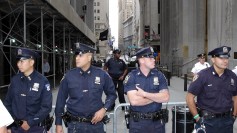With Journalism Persecuted, The United States Is Now At Event Horizon To A Police State
Falkvinge on Infopolicy 2013-06-30

Repression: Glenn Greenwald, the Guardian reporter who published Edward Snowden’s leaks, was recently suggested to be a criminal for shining light on the NSA’s abuse of power. This is a key identifiable step when societies close down; it is a point of no return. It seems the United States is reaching the event horizon to a police state.
To understand the pattern when societies close down, we need to look at other societies that have done so. There is much we can learn from history in terms of what happened in recent times. Let’s take a very well-known sequence of events in modern history as an example here, just to illustrate:
When the famous skyline landmark building in the world’s economic center was attacked in fire and flames on that fateful, horrible day, and our elected leaders decided to go to war against terrorism in a “you’re with us or against us”, there is something to learn from that. When the blame for all evil was unanimously put on people from the Middle East with their foreign religion, and all of them were made suspicious, there is something to learn from that. When patriotic new laws were passed almost immediately in the emotions from the attack, and those laws suspended most civil rights (even if those laws had a sunset provision, one that would never be reached). When the word “Homeland” suddenly started being used again, after having been practically extinct. When the country went to war, one after another, in the wake of that attack. When internment and torture camps for those middle-easterners and other unwanteds were created – outside the country borders, in order to hide what was going on from the public. Indeed, the 1930s were a very dark time, and the Reichstag fire in Berlin set off a chain of events that might – theoretically – repeat itself.
While this may seem a trivial observation, it is critical in this context: people tend to be focused on what affects them in the here and now. While some people can connect the dots and follow the line with their eyes into the future, the vast majority of people don’t bother with something that doesn’t affect them directly, personally, and in the present. In 1932, families were still skating in the park in Berlin on weekends. All that nasty stuff was theoretical, rumored, and somewhere else. People who look ahead and try to sound the alarm bell tend to be regarded as tinfoil hats, eccentric, and nuts.
One of the first things that happens past the point of no return into a police state is the persecution of reporters. As a society is closing down, those persecuted first are those with the audience and an interest in reporting the worrying trends that society seems to be closing. This is the proverbial canary in the coal mine. This is the alarm bell. Once that happens, get out of the mine.
An event horizon is a term from astrophysics. It is the edge of a black hole – so the event horizon appears like a black sphere, if you like. Nothing, not even light, can escape from within the event horizon – hence the term black hole. But if you were traveling through space, in direction of the black hole (which may be as large as an entire galaxy), then you would notice absolutely nothing as you crossed the event horizon. You would pass a point of no return, and register not a single thing while doing so. The analogy is depressingly apt.
I’ve written before that I believe that the U.S. is lost to encroaching totalitarianism, which it will likely endure for a number of years before it collapses under its own weight (as all empires do sooner or later). With Edward Snowden being hunted relentlessly across the globe for leaking evidence of systematic abuse of power, Glenn Greenwald – who published Snowden’s leaks – was recently criticized for aiding and abetting the leak itself. This is a key choice of words, for aiding and abetting a crime is itself a crime – the wording suggested that the reporter who published evidence of abuse of power is himself a criminal.
Can't believe @ggreenwald being cross-examined about being a criminal for reporting news, protecting sources #freedomofthepress
— FOI Central (@FOIcentric) June 24, 2013
It is notable that Julian Assange was hunted and disrespected in the same manner when he published Manning’s leaks in the role of the publishing reporter, by the way.
Now, it should be said that this reporter weren’t formally hunted by law enforcement. That’s actually secondary. It’s not necessary – the fact that the sentiment exists at all in society, that a reporter is criminal for doing his job, has enormous chilling effects and progresses the closing-down. But reporters are being formally persecuted as well.
Take the example of Barrett Brown. He published a lot of material that was inconvenient and embarrassing to the government – which is a reporters’ job – and was put under investigation for it. At that point, he did the crucial mistake of threatening the FBI agents who were harassing him and his family in a YouTube video, which is an act that doesn’t go unpunished in the United States. He was arrested and charged with something serious enough – but over time, the charges grew to the whole Christmas tree. Particularly, Brown was charged with publishing the leaks in the first place. In other words, Brown was charged with the crime of doing his exact job as a reporter. He has currently been in detention without bail for 291 days, and pretty much nothing is seen in oldmedia about it.
That’s crossing the event horizon.
The post With Journalism Persecuted, The United States Is Now At Event Horizon To A Police State appeared first on Falkvinge on Infopolicy.